Explained: One Nation One Election Concept – Big Question to Democracy?
India is undoubtedly the biggest democracy to ever exist, But is ‘one nation, one election’ a devious plot to quash away the democracy or to save it? What really is at stake here?
The term “one Nation, One Election” is been the talk of the town in terms of politics, for quite a while now. What exactly does it mean?
ONE NATION, ONE ELECTION is an agenda being pushed by the Prime Minister from 2016.
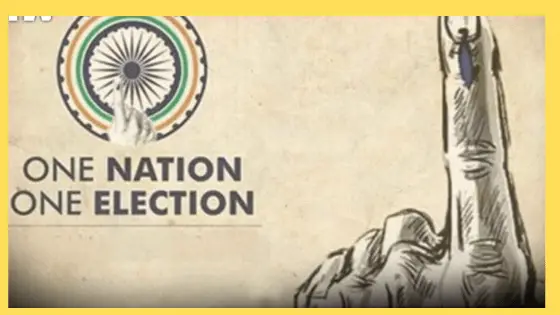
In a media interview in November 2016, Modi said:
“The Indian voter today is very mature. He votes in one fashion in the Lok Sabha elections and he votes in a different manner in the State assembly elections. We have seen this in 2014; the general elections coincided with the Odisha assembly elections. The same electorate gave one judgment for Odisha and another judgment for Delhi.”
The Niti Aayog did come out with paperwork in 2017 and the law commission gave its nod in 2018.
Table of Contents
What is ‘One Nation, One Election’ concept?
The implementation of this idea can lead to the voters voting for a single person or party as a whole. Not every state has a chief minister from a different party and this might end up in a total victory of a party. It defies the very essence of democracy.
The Lok Sabha and State elections were held simultaneously till the 1960s. When the state election had coalition parties, the governments were not stable. The idea was dismissed. This is what led to the conduction of election separately in India.
One nation One election definition:
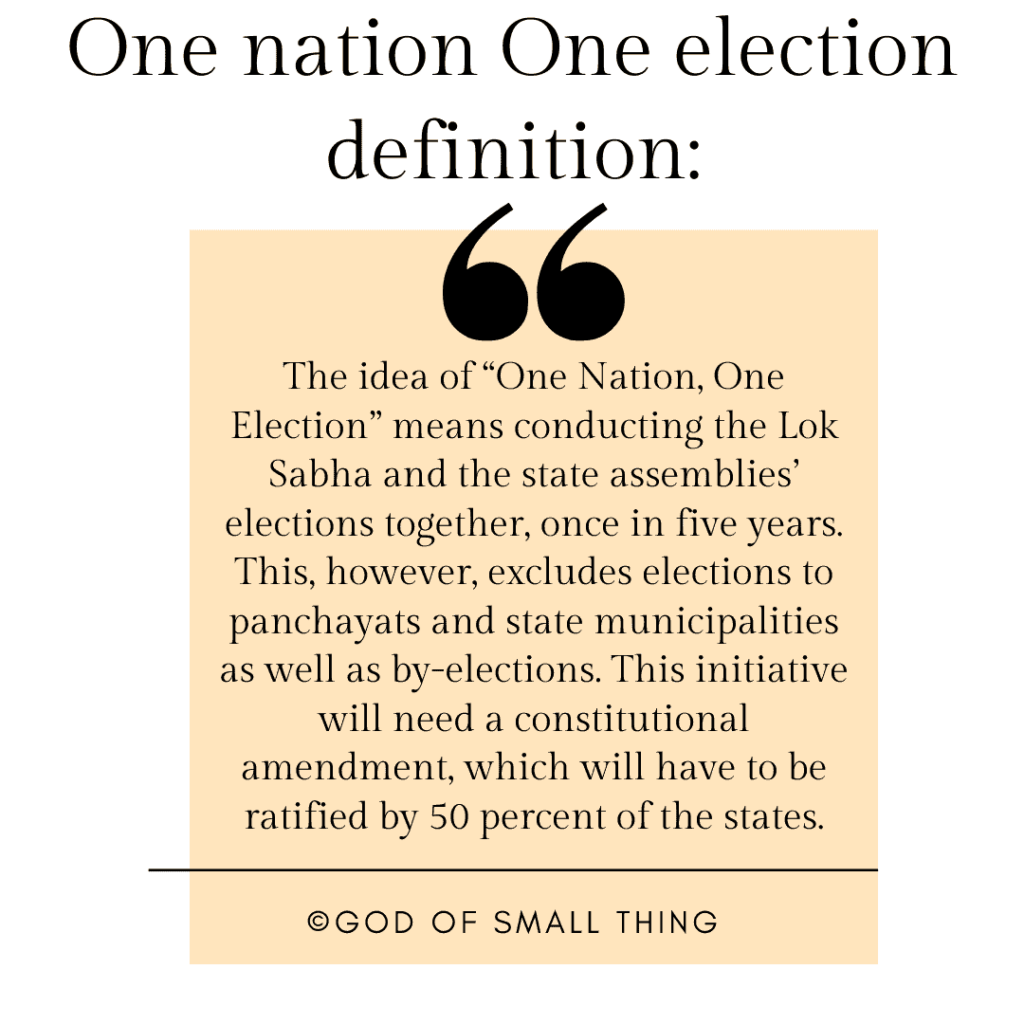
The idea of “One Nation, One Election” means conducting the Lok Sabha and the state assemblies’ elections together, once in five years. This, however, excludes elections to panchayats and state municipalities as well as by-elections. This initiative will need a constitutional amendment, which will have to be ratified by 50 percent of the states.
To get a deeper understanding of this concept, let’s discuss:
What is a Simultaneous Election?
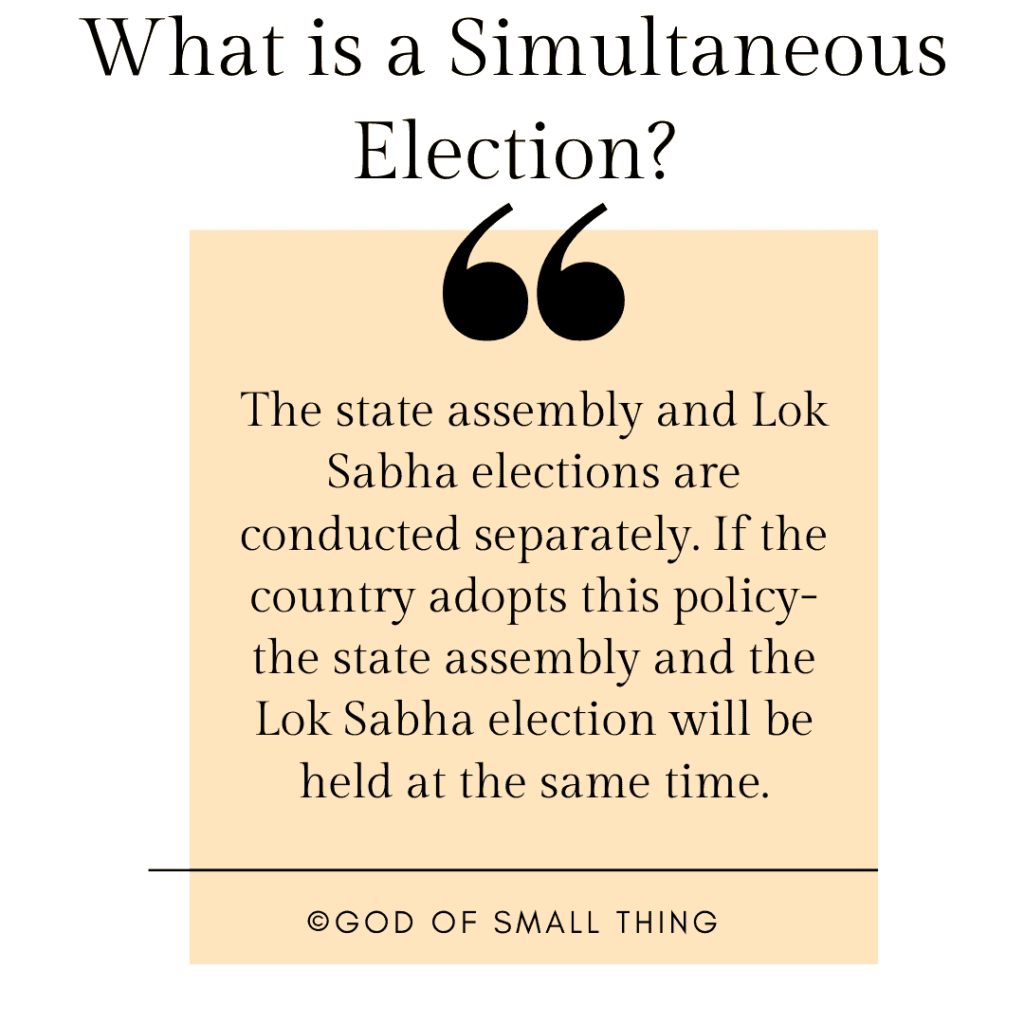
The state assembly and Lok Sabha elections are conducted separately. If the country adopts this policy- the state assembly and the Lok Sabha election will be held at the same time.
We were been asked to write by one of our readers to list out what the government of India has been doing to help Poor in the country. So here is a list of Poverty alleviation programmes in India – God of Small Thing. Looking for some info but could not find it? Type down in the comments section and we will help!
Challenges to Simultaneous Elections
Say, this policy gets a thumbs-up in the parliament, there will be multiple chief ministers with incomplete terms. Moving forward, Every state will have to re-conduct elections, regardless of whether their 5-year term is completed or not, by 2024. For example, Tamil Nadu will have its elections in 2021 and the state should re-conduct its elections by 2024. This will leave 1 year of the incomplete term for the ruling party.
Cons to Simultaneous Election:
- These kinds of Elections may reduce the total expenditure incurred, but there is no guarantee in reality. The parties can spend the entire amount allotted instead of spending it in intervals.
- The very concept of federalism will be violated. The nation Elections might overpower the state elections and decrease the importance of it.
- Simultaneous Elections which have a fixed period of 5 years might take away people’s to express their dissatisfaction with a government rule.
Pros to Simultaneous Election
- Simultaneous Election promotes the unity of a country. These Elections promote national perspective over the state.
- The Elections bring states on par with the central government. It strengthens federalism.
- If simultaneous elections are taken once in 5 years, it provides a sense of stability. It will allow the government to take difficult decisions in the larger public interest.
There is quite a debate on the matter among people. Let’s see the advantages and disadvantages of “One Nation, One Election”.
Advantages of the One Nation One election Concept:
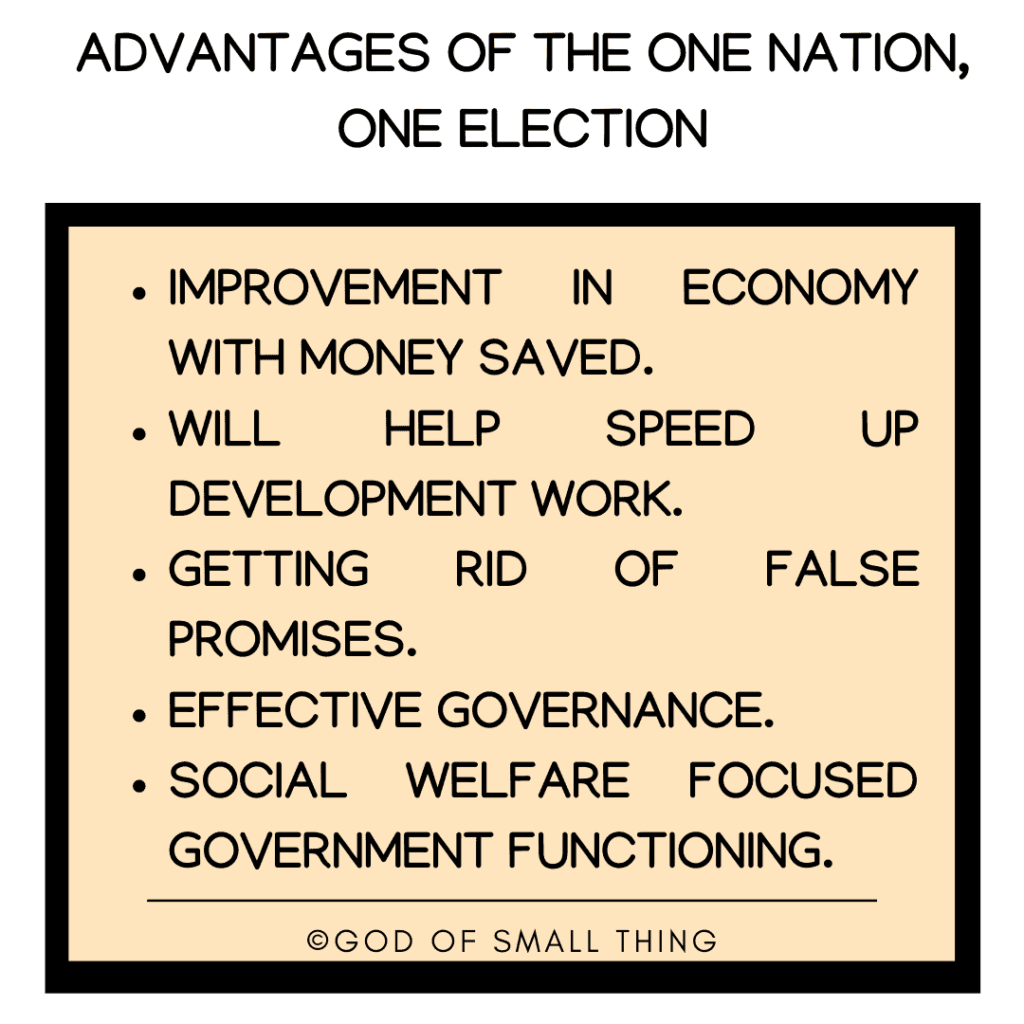
- In 2018, the Department of Legal Affairs asked the Law Commission to study the issue of simultaneous elections and submit a report. The report brought firth the benefits of a single election: “From financial considerations, implementing simultaneous elections seem to be not only feasible but also desirable. It will result in a reduction of enormous costs involved in separate elections.”
- The state government, national government, and the Election Commission incur the expenditure for the election. This results in every election having a higher expenditure than the previous one, therefore, a once in 5-years election will decrease the expenditure exponentially and release a financial burden on the government.
- Elections usually disrupt the daily of the citizens residing in the election booths’ area. The security required for such an event will also reduce.
- Parties use black money and booth capturing, as ways to gain favor in votes and win the election. With fewer opportunities and undivided attention of the Election Council, this can reduce to the minimum.
- Most people opposing this idea say that this is totally unconstitutional and cannot be followed in India, as the constitution is absolute. But, on the contrary, the constitution does nowhere clearly mention whether the ‘One Nation, One Election” initiative can be implemented or not. One thing is for sure, there will have to be quite a few amendments to accommodate this idea.
The argument against simultaneous elections in the NITI Aayog’s paper read, “Having to face the electorate more than once every 5 years enhances the accountability of politicians and keeps them on their toes.” The Guarantee of a 5-year office might make the officials lazy and unaccountable towards their actions.
- The political parties will focus on the agendas they present to the public in their manifestos instead of constantly thinking about election focused strategies.
Disadvantages of the ‘One Nation One Election Concept:
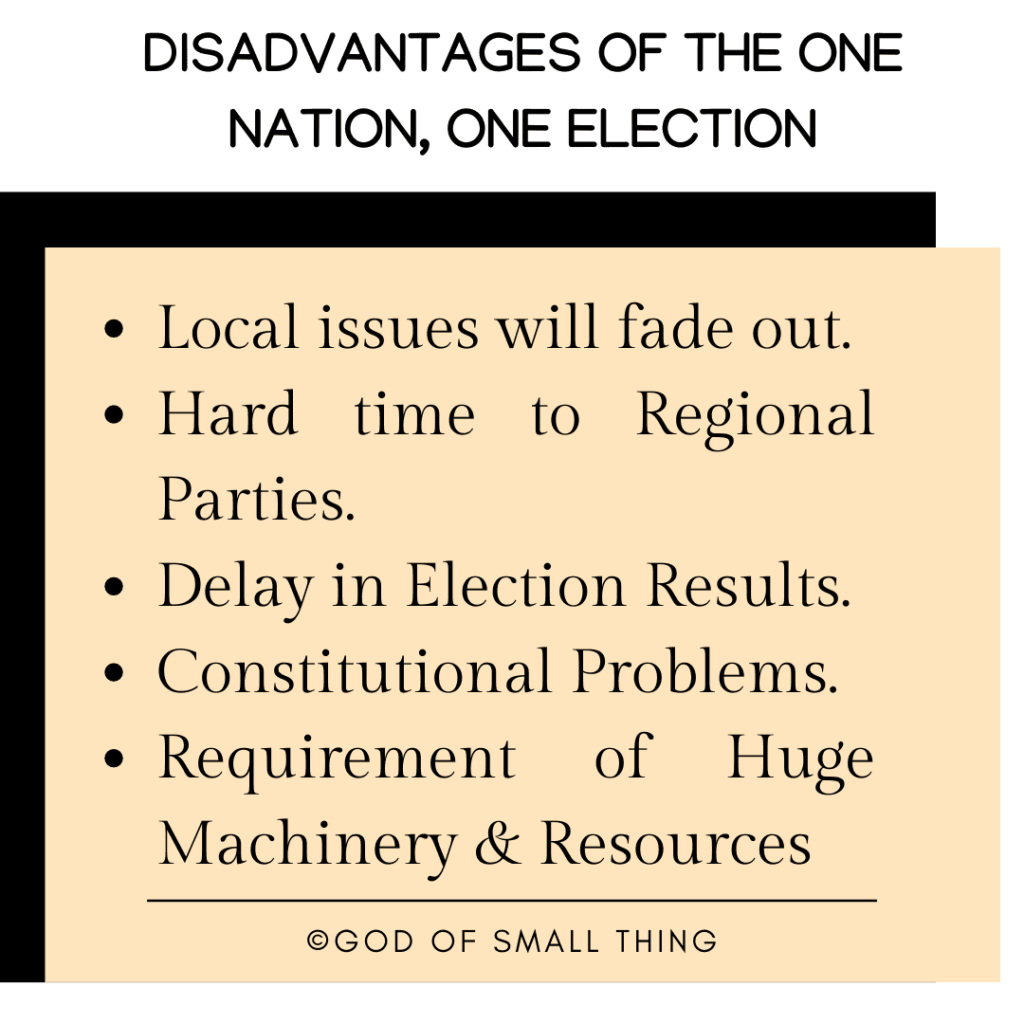
- Previously, the simultaneous elections brought about a collapse in several governments. This may happen again if a new cycle of simultaneous elections begins.
- The state government, national government, and the Election Commission incur the expenditure for the election. The is an exponential amount of expenditure incurred.
- The National and State agendas vary- for a state election, the agendas concern regional problems and the national agendas are of a larger scale. The elections conducted separately will have the voters vote for the party who supports their specific agenda. When mixed together a party would have 2 different agendas, two different manifestos. One for the state and other for the general election. This will only create chaos and confusion in a voter’s mind.
- The national parties will have issues that hold a higher level of importance than the states’.
- Furthermore, there will have to be quite a few amendments to the constitution, in order to accommodate this initiative. The Supreme Court strictly prohibits this.
- There are a lot of questions raised regarding the ability of the Election Commission Council to conduct large scale elections, that is, requirements of security and manpower.
- Elections also give rise to corruption, huge sums of money are being spent in the time of the election. These funds are put to unethical use and practices. More Elections, more Corruption.
Also Read! Can we implement Uniform Civil Code in India? All Questions answered – God of Small Thing
Which articles of the Indian constitution require amendments?
- Article 83 which states that the council of states will not be dissolved, but 1/3rd of the council members should retire every 2 years in accordance with provisions made behalf of the Government.
- Dissolution of Lok Sabha by the Parliament in Article 85.
- The state legislature will continue for 5 years from the date of the appointment unless it is sooner dissolved states Article 172.
- Article 174 is related to the dissolution of said state assemblies.
- Article 356 which states that “if the president is unsatisfied with a situation that arises in a government of a state which is not in accordance with the constitution, the president is empowered to take away legislative rights of a state in question.”
One of the biggest reasons for accepting One Nation, One rule is it is financially beneficial. How much does it cost to conduct the elections in India?
While there are questions around education in the country. Here is a must-read story of an IAS Officer: Revamping Schools To Curbing Child Marriage: How An IAS Officer Is Transforming Rajasthan
It is necessary to mention that the total government expenditure for the very first three general elections was Rs. 10 crores each. This will give you a rough idea of how does the government really spends on an election nowadays.
Cost of Conducting Elections in India
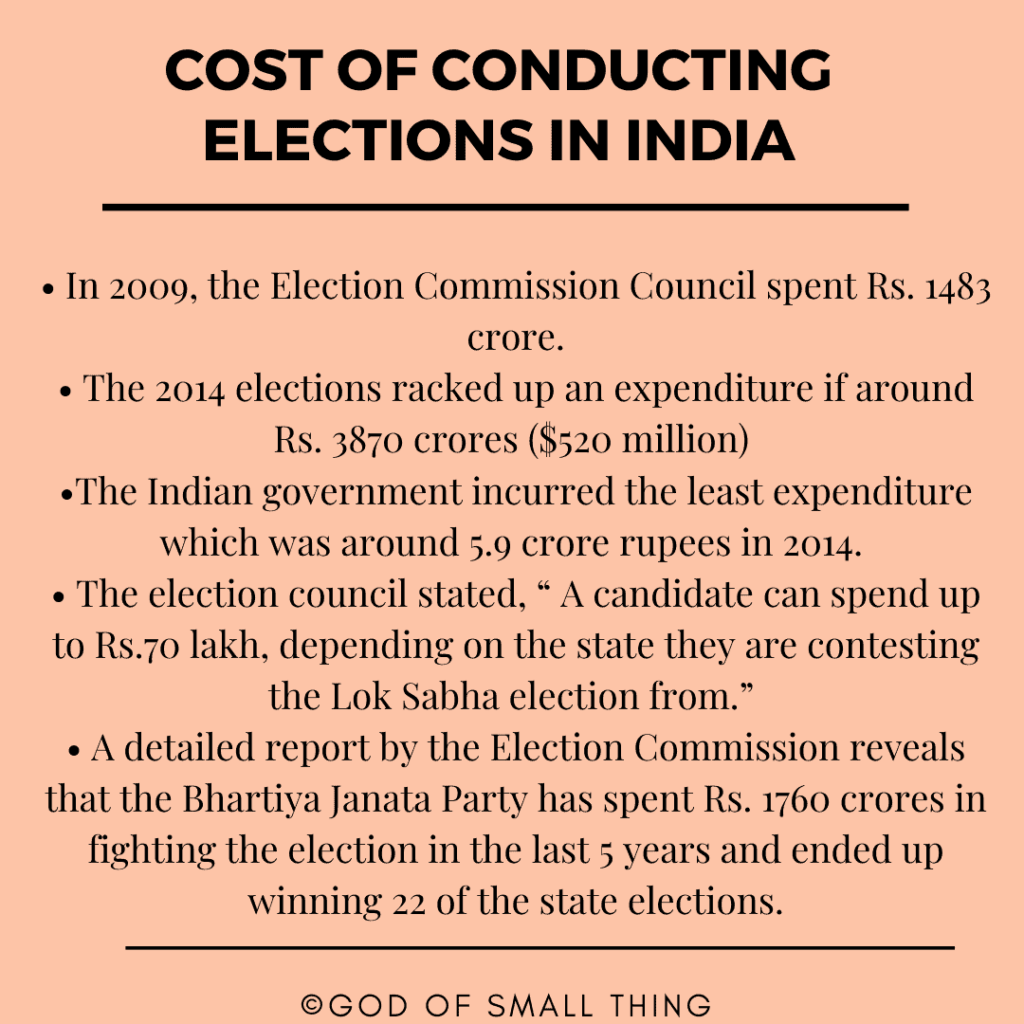
- In 2009, the Election Commission Council spent Rs. 1483 crore.
- The 2014 elections racked up an expenditure if around Rs. 3870 crores ($520 million)
- The Indian government incurred the least expenditure which was around 5.9 crore rupees in 2014.
- The election council stated, “ A candidate can spend up to Rs.70 lakh, depending on the state they are contesting the Lok Sabha election from.”
- A detailed report by the Election Commission reveals that the Bhartiya Janata Party has spent Rs. 1760 crores in fighting the election in the last 5 years and ended up winning 22 of the state elections.
Is One Nation, One election a good step for India?
From this data alone, we can conclude that every year the cost of elections keeps on increasing rapidly, this wouldn’t be considered a healthy democratic practice. This might give the harsh truth that only the rich can win an election. The Election Commission should work in this aspect and try and reduce these huge sums of money the elections cost our government.
There will be support and opposition There are pros and cons to every situation, and so does this idea. there will be no difficulty in implementing the idea if the amendments are made according to the requirements.
This issue is highly debatable, What is your view on this?
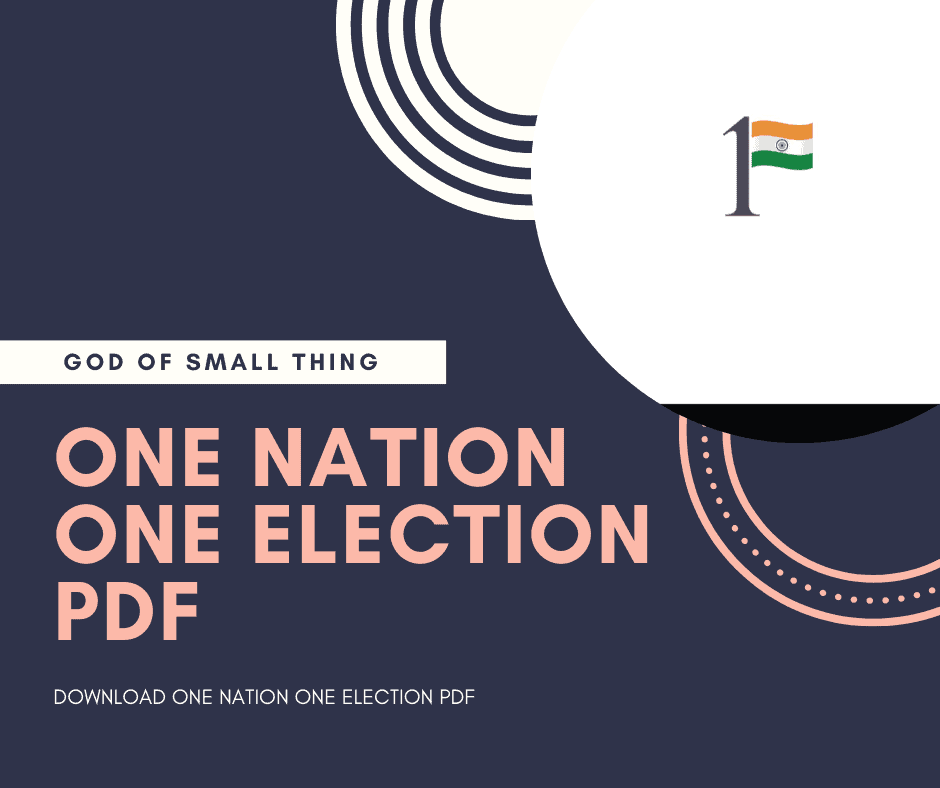
You can read in-depth and understand all aspects of this initiative in this One nation One Election pdf: One Nation, One Election’ pdf.



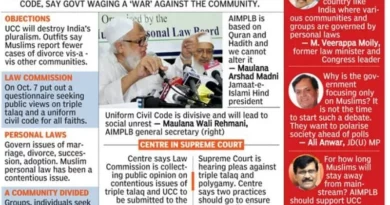
I think that people may vote to regional parties instead of national parties these may form again collation drama no party can get majority in lok sabha. Instead of this i think that people may vote directly to c.m or p.m so there will be no number drama of majority
I did not know about this concept until now. It’s a well-written, informative article. Kudos!
Pingback: Can we implement Uniform Civil Code in India? Pro's & Cons of UCC -Everything Explained
Pingback: List of Cabinet Ministers of India 2019 with departments with PDF